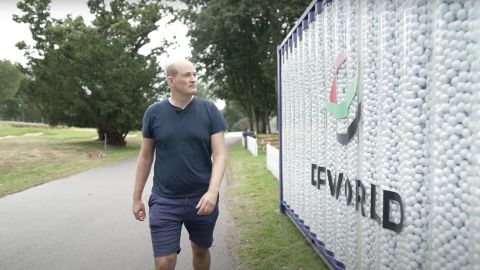CNN
—
Lost in the rough, found with a ruff – in South London, an eagle-eyed dog and his owner have perfected an unusual solution to the evergreen problem of lost golf balls.
During the past five years, four-legged finder Marlo has scampered through the woods and long grasses of local courses to help owner Charles Jefferson collect over 6,000 golf balls left behind by stray-shooting players.
Admittedly more a hunter than a gatherer, the cavapoo’s penchant for chasing balls has made him an invaluable asset in tracking errant shots. Jefferson follows in Marlo’s wake with empty buckets at the ready, writing off a few balls each run as chew casualties.
An estimated 300 million golf balls are lost each year in the US alone, and they represent a major litter problem, but also a potential source of revenue. A fully fledged retrieval industry sees contractors across the globe scouring the woods – and even lakes – of courses, with one UK-based golf ball diving company projecting that up to £100,000 (about $114,000) could be earned annually by those willing to take the plunge.
Retailing at around £4 ($4.50) per ball first-hand, the Titleist Pro V1 represents the hole-in-one prize of the collecting world, with a perfect condition finding offering up to £3 (about $3.40) in resale value.
As a big-hitting amateur golfer of over four decades and a former employee of the European Tour, none of this was lost on Jefferson. Imagine his surprise then, when, on his first time taking the family’s newest addition for a walk around his local links course, he watched the puppy emerge from the bushes with a mint-condition Pro V1 between his jaws.

Since then, such treasures have been a surprisingly routine find on the duo’s weekly evening trips to Mitcham Golf Club and Wimbledon Common Golf Club. Yet, other than once selling 600 Pro V1’s to friends – to sell on to other club members – for around £300 (about $340), Jefferson has never had any interest in profiting from Marlo’s discoveries.
“I didn’t set out to go, ‘Ah I’m going to create a little business out of this’,” the 52-year-old told CNN.
“Growing up, having golf balls was always a bit of a luxury, and having lost a lot of golf balls as well, being the type of golfer to hit the ball a long way… to me, I see a lot of value in it .
“I partly see it as a bit of a service, picking up a lot of litter, and it’s partly for myself – I’m never going to buy a golf ball again.”
The 300-plus Pro V1’s crammed into a drawer of Jefferson’s home are a testament to this, although he now limits his keepers to the newest, premium finds and has given bucket-loads to local charity shops.
The rest of his finds, around 3,000 balls, were left at the course, sprinkled around the tees as “easter eggs” for golfers to discover the following morning.
Even though it would dent his own personal supply, Jefferson longs to see golfers taking greater care to use as few balls as possible during rounds.
“It’s a reflection of our throwaway society, and a lack of concentration,” he said. “People hit a ball and immediately they’re talking to their buddies, they haven’t tracked where their ball’s gone.
“I just feel there’s an attention deficit going on – people almost expect that their [playing] partner is going to find it for them.”
Tales of Jefferson’s overflowing stash of golf balls have long been a running joke among colleagues at 160over90, the branding agency where he works. So when a project arose to promote a ball-collecting container on the DP World Tour, all eyes turned to Jefferson.
Weighing in at 12 tons when full, the repurposed 20 foot shipping container has been steadily filled with balls donated at various Tour events throughout the season – 40,000 balls so far.

Following it’s sixth and final appearance at the UAE’s DP World Tour Championship in November, the balls will be redistributed to five international golf beneficiaries: Kenya’s Junior Golf Foundation, the South African Disabled Golf Association, the European Disabled Golf Association, the UAE’s Chicks with Sticks , and India’s Golf Foundation.
At the BMW PGA Championship in Wentworth, London, in September, Jefferson and Marlo dropped off 600 of their finds to make an admirable dent in the container’s 200,000 ball capacity.

“I felt that was a better way than sending it to our local charity shop and some guy coming and picking up a load of balls,” Jefferson said.
“If there was a way to give more I would, because there’s a lot of grassroots communities around the world that could benefit from half-decent golf balls.”
.